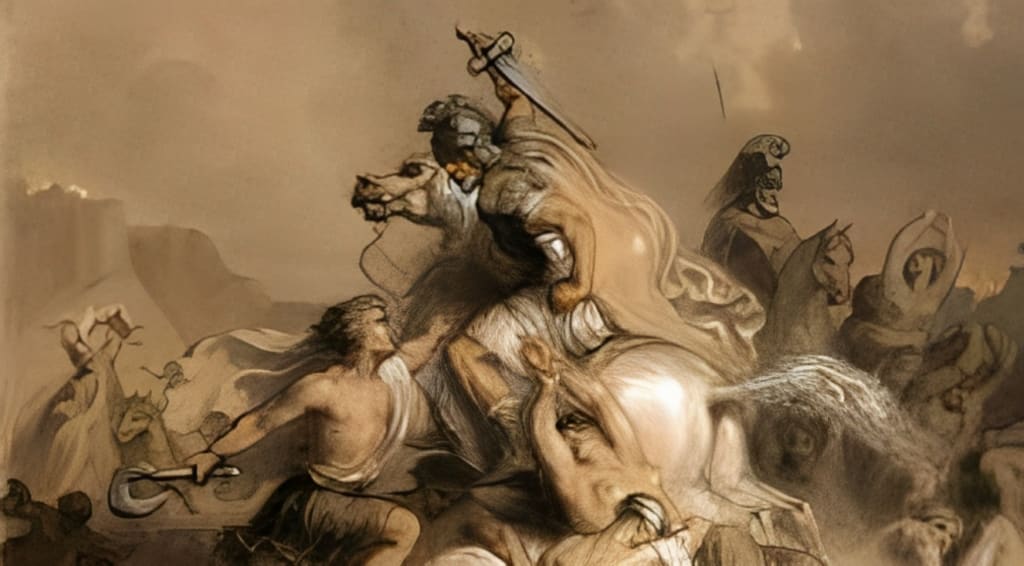The Barbarians
The origin and history

Historical Context and Origins of the Barbarians
The term "Barbarians" originated in ancient Greece and Rome, referring to diverse groups outside their respective civilizations. The Greeks used the term to denote those who did not speak Greek, while the Romans applied it to non-Romans. The Barbarians hailed from various regions, such as Central Asia, Northern Europe, and the Eurasian Steppe. Their origins and migrations can be traced through archaeological evidence, historical accounts, and linguistic studies, revealing a complex tapestry of cultures and societies.
Characteristics and Stereotypes Associated with the Barbarians
Barbarians were often portrayed as uncivilized, wild, and lacking in sophistication by the Greeks and Romans. These stereotypes arose due to cultural differences and the perceived contrast with the established norms of the dominant civilizations. However, it is important to note that such characterizations were subjective and influenced by ethnocentrism. In reality, the Barbarians had rich and diverse cultural traditions, including their own systems of governance, religious beliefs, and artistic expressions.
Famous Barbarian Tribes and Leaders
Numerous Barbarian tribes left an indelible mark on history, and their fame stems from their military prowess, cultural achievements, and lasting impact on subsequent civilizations. The Visigoths, led by Alaric, were known for their successful sack of Rome in 410 CE, a symbolic event that highlighted the vulnerability of the once-mighty empire. Alaric's actions marked a turning point in history and contributed to the decline of Roman authority.
The Huns, under the leadership of Attila, were feared by both the Roman Empire and their Barbarian neighbors. Attila's military campaigns and ability to unite various tribes made him a formidable leader. His invasion of the Roman Empire in the mid-5th century caused widespread devastation and contributed to the unraveling of Roman control in certain regions.
The Vandals, led by Gaiseric, established a kingdom in North Africa after their migration from Eastern Europe. Their capture and sack of Rome in 455 CE left an enduring legacy of destruction and symbolized the weakening of Roman power.
Other famous Barbarian tribes include the Ostrogoths, who under the leadership of Theodoric the Great, established the Ostrogothic Kingdom in Italy. The Lombards, led by Alboin, founded the Lombard Kingdom in what is now Italy. The Franks, led by Clovis, established the Merovingian dynasty, which later transformed into the Carolingian Empire under Charlemagne. The Angles, Saxons, and Jutes migrated to the British Isles, contributing to the formation of the Anglo-Saxon kingdoms.
Impact of the Barbarians on World History
The impact of the Barbarians on world history was profound and far-reaching. Their migrations, conquests, and interactions with established civilizations reshaped political boundaries, cultural landscapes, and social dynamics. As the Western Roman Empire declined, Barbarian tribes established their own kingdoms across Europe. These new kingdoms introduced their systems of governance, cultural practices, and languages, leading to the formation of medieval Europe.
The Barbarians played a significant role in the shaping of the Gupta Empire in India as well. While not directly involved in the empire's formation, their presence and interactions influenced regional dynamics. The Huna invasions, led by the Barbarian tribes known as the Hephthalites, posed a significant threat to the Gupta Empire. These invasions disrupted trade routes and had a destabilizing effect on the region. The Gupta rulers successfully defended their territories against the Barbarian incursions, and their resilience helped solidify the Gupta Empire's power and influence.
In addition to their military impact, the Barbarians brought their cultural traditions, artistic expressions, and languages to the regions they inhabited. Over time, these cultural exchanges led to the fusion of Barbarian and Roman elements, giving rise to unique syncretic cultures that continue to shape the identity of modern nations.
The Fall of the Roman Empire, the famous Barbarian tribes and leaders, and the impact of the Barbarians on world history collectively provide a rich tapestry of historical events, personalities, and transformations. By studying these interconnected aspects, we gain a deeper understanding of the complexities of the past and appreciate the profound influence Barbarian cultures had on the course of human history.
The Fall of the Roman Empire and the Role of the Barbarians
One of the most significant events in world history was the fall of the Western Roman Empire, and the Barbarians played a crucial role in this transformative period. While it is essential to acknowledge that internal decline, economic challenges, and political instability within the empire contributed to its fall, the Barbarian invasions were instrumental in bringing about its downfall. The Barbarians, driven by various factors such as population pressures, territorial ambitions, and the search for resources, seized the opportunity presented by the weakening Roman Empire. Their military campaigns and conquests gradually dismantled Roman authority and disrupted the once-mighty empire.
Misconceptions and Misrepresentations about the Barbarians
Throughout history, misconceptions and misrepresentations about the Barbarians have persisted. The portrayal of Barbarians as solely savage and destructive oversimplifies their complex cultures and contributions. It is crucial to challenge these misconceptions and engage in nuanced historical analysis to appreciate the diversity and significance of Barbarian societies. Modern scholarship strives to reassess these stereotypes and highlight the Barbarians' multifaceted historical roles.
Modern Interpretations and Representations of the Barbarians
The legacy of the Barbarians continues to inspire and captivate modern imagination. Their stories and symbols are often depicted in literature, art, film, and popular culture, creating various interpretations. Some representations romanticize the Barbarians' fierce independence and resilience, while others focus on their clashes with established civilizations. Such modern interpretations reflect contemporary perspectives, interests, and cultural dynamics, often influenced by evolving understandings of history and identity.
The Legacy of the Barbarians in Contemporary Society
The legacy of the Barbarians extends beyond their historical existence. Their impact on language, law, and cultural heritage has left indelible imprints on modern societies. The Barbarians' influence on the development of European languages, such as English, German, and French, is evident. Additionally, legal systems, social structures, and artistic traditions bear traces of Barbarian contributions. Exploring this legacy allows us to better understand the intricate tapestry of human history and appreciate the interconnectedness of diverse cultures.
Conclusion and Final Thoughts
The study of Barbarians reveals a complex and multifaceted history that challenges simplistic stereotypes. By delving into their origins, impact, and legacy, we gain a deeper understanding of the diverse societies that existed beyond the borders of ancient Greece and Rome. Recognizing the significance of Barbarian cultures enriches our knowledge of world history and fosters a more inclusive and nuanced perspective. Exploring their stories invites us to appreciate the complexities of human civilization and the enduring legacies left by these diverse and vibrant societies.
.....................................................................
Author's Note: Unfortunately, there is no evidence to suggest that the Barbarians played a direct role in shaping the Gupta Empire of India. The Gupta Empire flourished from the 4th to the 6th century CE, while the Barbarian migrations primarily occurred in Europe during the same period. So it can't be proven that the Barbarians played a direct role in shaping the Gupta Empire.
About the Creator
Écrivain Placard
Curious reader and researcher, always exploring the lesser-known corners of the world. Sharing obscure findings and insights with fellow knowledge-seekers. Never satisfied with the obvious, always digging deeper for the truth.






Comments
There are no comments for this story
Be the first to respond and start the conversation.